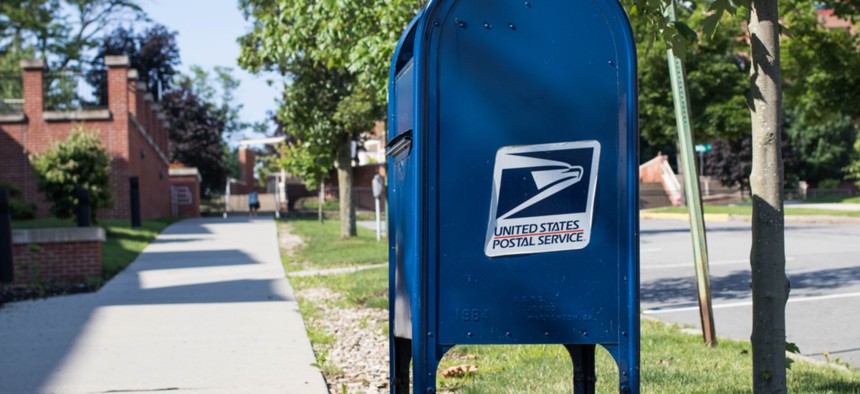State Attorneys General May Sue Trump Administration Over Changes to USPS

State officials are concerned about recent changes at the U.S. Postal Service. Shutterstock
State officials are alarmed by recent changes at the U.S. Postal Service, which could threaten an election held largely via mail-in voting.
The battle over the future of the U.S. Postal Service heated up this weekend, with at least seven state attorneys general reportedly considering a lawsuit against the Trump administration over funding and policy changes to the agency before the election.
Long mail delays, mailbox removals, reduced post office operating hours, mail delivery schedule changes, and a decision to decommission 10% of the agency’s sorting machines have sparked concern among election officials who say these factors greatly threaten the nation's ability to conduct a smooth election.
The Washington Post first reported on Sunday that attorneys general in California, Massachusetts, Minnesota, North Carolina, Pennsylvania, Virginia, and Washington were considering legal challenges to recent operational changes at USPS that could hamper the effectiveness of the agency as states prepare to handle an election that is expected to see a high rate of mail-in voting due to the coronavirus outbreak.
In an email to Route Fifty, a representative for California Attorney General Xavier Becerra said that "USPS has become even more important amidst the pandemic" and that "any efforts to undermine USPS...threaten to undermine free and fair elections."
The attorneys general have not released any specifics about what legal actions they might take. Massachusetts Attorney General Maura Healey said they are considering “all options.”
"We will not be deterred by Donald Trump's blatant attempts to undermine the integrity of our elections,” she said in a statement. “We are exploring all options available to ensure everyone's vote is counted.”
With the pandemic still forcing limitations on in-person activities, the November election is likely to see the highest rate of votes cast by mail of any national election in U.S. history. With at least three-quarters of registered voters eligible to vote by mail this year, experts predict that roughly 80 million votes are expected to come via mail-in ballots.
Nine states and Washington D.C. are automatically mailing ballots to all registered voters. An additional 34 states have expanded vote-by-mail eligibility to all registered voters, though they will have to request an absentee ballot in advance of the election. In seven states, including New York and Texas, voters still need a reason other than the coronavirus to be eligible for absentee voting—though this may change as pending bills in state legislatures could create last-minute rule changes to expand absentee voting to more people.
The Postal Service recently warned 46 states and Washington D.C. that it cannot guarantee that ballots for the November election will arrive in time to be counted. Election officials in some states are scrambling to respond to the warning, either by shifting forward the timeline by which voters will receive absentee ballots or pushing back the deadline for counting ballots until a few days after the election.
President Trump has pushed back on these efforts, saying that the country “must know election results on the night of the election, not days, months, or even years later!"
The president has repeatedly claimed without evidence that widespread mail-in voting will be “catastrophic.” Election experts note that mail-in voting is safe and has been used for decades in some states without a higher rate of fraud than in-person voting.
At the federal level, Democrats in the House and Senate have launched an investigation into the changes at the USPS, claiming that the Trump administration has exerted undue influence over the agency since appointing Postmaster General Louis DeJoy, something that the agency denies.
More than 80 lawmakers, including some Republicans, sent a letter to DeJoy on August 6 to express “deep concerns” about the operational changes he has instituted that could “cause significant delays in mail delivery.” They note that though the Postal Service is dealing with financial problems and some changes may need to happen to deal with the funding crunch, DeJoy’s rhetoric “compares the Postal Service to a private company concerned only with the bottom line, rather than the constitutionally mandated public service that it is.”
House leaders have asked DeJoy to testify before the Oversight Committee next Monday. The state attorneys general who are considering legal action over the USPS changes have indicated that they support that move.
“DeJoy and the entire Trump administration must answer for exactly what's going on,” Virginia Attorney General Mark Herring said in a tweet. “In the meantime, we're going to keep exploring our legal options to stop this assault on our democracy.”
Pennsylvania’s Josh Shapiro, another attorney general considering litigation, offered simple advice to residents of his state who were concerned about whether or not their vote will be counted come November.
“There’s a lot of news out there about mail-in voting,” he tweeted. “My advice: Don’t panic. Vote early.”
This story was updated after publication to reflect that California has joined the list of states considering litigation.
Emma Coleman is the assistant editor for Route Fifty.
NEXT STORY: Can the Election Assistance Commission adapt to changing technology?






